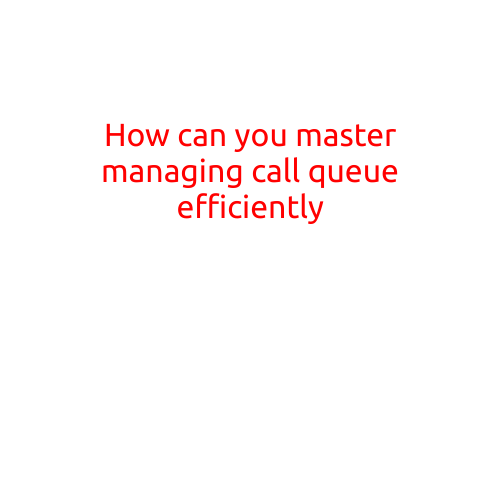
How Can You Master Managing a Call Queue Efficiently?
In today’s fast-paced business world, efficient call queue management is crucial for providing exceptional customer service, improving productivity, and driving business growth. A well-managed call queue can help reduce wait times, minimize hold times, and ensure that customers receive prompt and personalized attention. However, managing a call queue can be a daunting task, especially for businesses that receive a high volume of calls.
In this article, we will explore the importance of call queue management, discuss the key challenges that businesses face, and provide practical tips on how to master managing a call queue efficiently.
Why Call Queue Management is Crucial
A well-managed call queue can bring numerous benefits to your business, including:
- Improved Customer Satisfaction: By reducing wait times and hold times, you can provide customers with a better experience, increasing their satisfaction and loyalty.
- Increased Productivity: A efficient call queue management system can help agents manage their time more effectively, reducing the risk of burnout and improving overall productivity.
- Enhanced Sales and Revenue: By quickly addressing customer inquiries and resolving issues promptly, you can increase sales and revenue, as well as reduce the risk of lost business.
- Better Resource Allocation: A well-managed call queue can help you identify patterns and trends, allowing you to allocate resources more effectively and make informed business decisions.
Common Challenges in Call Queue Management
Despite the importance of call queue management, many businesses face common challenges, including:
- Increased Call Volume: A high volume of calls can overwhelm agents, leading to increased hold times and reduced productivity.
- Agent Burnout: Constantly dealing with a high volume of calls can lead to agent burnout, resulting in reduced morale and turnover.
- Difficulty in Prioritizing Calls: Agents may struggle to prioritize calls, leading to delays and increased wait times.
- Inefficient Call Routing: Incorrect call routing can lead to delays and frustration, both for agents and customers.
Tips for Mastering Call Queue Management
To overcome these challenges and master call queue management, consider the following tips:
- Monitor and Analyze Call Data: Regularly monitor and analyze call data to identify patterns and trends, allowing you to make informed decisions about staffing and resource allocation.
- Implement a Prioritization System: Establish a prioritization system to ensure that critical calls are addressed first, and that agents focus on the most important tasks.
- Optimize Call Routing: Ensure that calls are routed efficiently and effectively, reducing wait times and minimizing hold times.
- Implement IVR and Auto-Attendant Features: Utilize IVR (Interactive Voice Response) and auto-attendant features to provide customers with self-service options, reducing the volume of calls and improving overall efficiency.
- Provide Agent Training and Support: Provide agents with comprehensive training and ongoing support to ensure they have the skills and knowledge to manage a high volume of calls effectively.
- Incorporate AI-Powered Call Management Tools: Leverage AI-powered call management tools to automate repetitive tasks, such as call queuing, and provide agents with real-time insights and analytics.
Conclusion
Mastering call queue management is crucial for businesses that receive a high volume of calls. By understanding the importance of call queue management, identifying common challenges, and implementing practical tips, you can provide exceptional customer service, improve productivity, and drive business growth. Remember to monitor and analyze call data, implement a prioritization system, optimize call routing, provide agent training and support, and incorporate AI-powered call management tools to achieve optimal call queue management.





